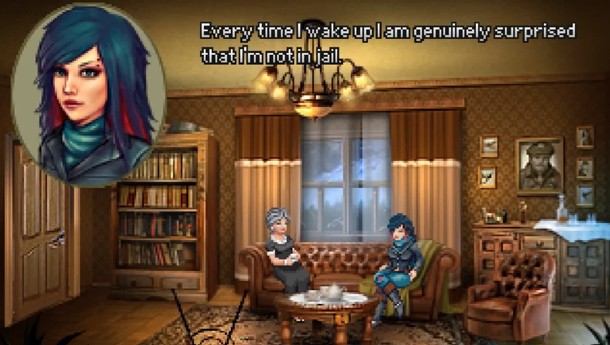Poor Sales Could Have Killed This Small Developer, But Its Publisher Is Breaking The Industry’s Fatal Cycle

The gaming industry has an all too predictable pattern. If a game sells well, it gets a sequel or the developer gets to live for at least one more game. If a title does poorly, it could mean doom, especially for small, newer studios.
Raw Fury, a relatively new boutique publisher, recently released its second game, Kathy Rain. The company’s first game, Kingdom, covered expenses in the first 24 hours. Kathy Rain, a '90s-inspired point-and-click adventure, didn’t fare quite as well.
Instead of parting ways with Joel Staaf Hästö, the one-man development team known as Clifftop Games, Raw Fury is taking the long view. The company is confident that with some time, the revenue will catch up with the critical acclaim Kathy Rain has received.
“It will take a bit of time but that’s A-OK,” the company writes. “We were prepared for that. We can afford to be patient. We have money for a rainy day. We can wait. But do you know who can’t wait? Joel. The developer.”
Because publishers usually hold revenue sharing until their own investment is paid off, developers run the risk of folding when their games have a slow burn. Publishers are often diversified and factor in risk. Developers, especially small studios, are laser focused on their single game.
“Some of us here at Raw Fury have spent many years on the developer’s side, and we are intricately familiar with The Developer’s Valley of Death,” the company says. “As the weeks and months pass by, you start to grow desperate. Maybe you take on a work-for-hire contract that, essentially, takes away some (or all) of your independence. Maybe you get more money from the publisher in exchange for the IP, an additional share of the revenues, your second child ,or some other added constraints. Maybe you just stop independent development altogether and walk away.”
As an alternative, Raw Fury is funding Clifftop Games for the next 12 months or until expenses are recuperated and royalties are shared. They aren’t taking the IP, and only require a mobile version to be finished, which was part of their original deal. Hästö is already working on something new, and Raw Fury isn’t demanding first right of refusal to publish in return for the extended financing.
On the surface, this seems like folly. It certainly flies in the face of what people would consider a sound business decision, but Raw Fury says there’s something more than money at stake.
“Our long term growth is found in our reputation, approach, and behavior,” the company says. “We want our actions to speak loudly. We’ve helped create and publish two amazing games already and here is an opportunity to affect a broader change when it comes to the dynamics of a classic publisher/developer relationship. And we truly want to be a catalyst of change.”
Ultimately, Raw Fury says this is about redefining success to be about more than money. And ultimately, the publisher seeks to rebalance the concept of making games to give the artistic value more weight in the equation.
“In this day where closing studios is the established and accepted norm, we want to do our part to combat the norm, the company writes. “We want to challenge how success is measured and point out that money shouldn’t be the only applied metric. In an industry that is smack full of impostor syndrome, depression, anxiety, and other things that are sometimes associated with the emotional work that goes into creativity, it is also important to think about how we measure success and failure. Of course money is important, as an enabler, but sometimes you need help creating something that doesn’t only serve commercial value, but an artistic need. Not acknowledging that is to miss the point of making games.”
[Source: Raw Fury]
Our Take
I’m a pragmatist, and as one, the idea of funding a developer without quid pro quo feels alien. However, Raw Fury does an admirable job of reminding me (and hopefully others) about the importance of games as a medium. This kind of faith in a developer and the resulting artistic product isn’t unique, but it is rare.
This isn’t about Raw Fury putting the developer’s needs in front of its own. That would be a mistake. Instead, this is a publisher redefining how it views success and investing in its future by prioritizing good will. When you look at it through that lens, this might not be the right business decision for every company, but it is the right one for this company.

Get the Game Informer Print Edition!
Explore your favorite games in premium print format, delivered to your door.
- 10 issues per year
- Only $4.80 per issue
- Full digital magazine archive access
- Since 1991









